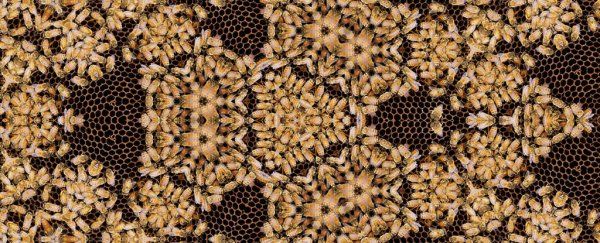During the spectacular event of a total solar eclipse, humans emerge blinking from their dens to enjoy the awe-inspiring show. But what of the bees? According to new research, they stop flying and go completely silent.
Over the years, scientists have jumped at every opportunity to study animal behaviour during solar eclipses. We know that birds and diurnal reef fish bed down (while nocturnal fish start to emerge), orb-weaving spiders take down their webs, chimps gather to take a look, and cows carry on grazing like normal.
But not much has been done to observe how bees behave. So researchers from the University of Missouri decided to take advantage of citizen science and the 21 August 2017 total solar eclipse that swept across America.
Over 400 scientists, citizen scientists, and school students set up 16 acoustic monitoring stations in the path of totality, in Oregon, Idaho, and Missouri, to listen for and record any bee buzzing.
The system, which had been recently field-tested by University of Missouri biologist Candace Galen to record pollination activity through listening for bee sounds, consisted of small USB microphones.
These were hung in areas away from human foot traffic, with high levels of bee pollination activity, along with light and temperature sensors in some of the locations.
"It seemed like the perfect fit," Galen said. "The tiny microphones and temperature sensors could be placed near flowers hours before the eclipse, leaving us free to put on our fancy glasses and enjoy the show."
When the show was over, the devices were returned to Galen's lab, where the buzz data gathered was matched up to the time of the eclipse. Although there was no way to tell which species of bees were buzzing, the most common in the areas were bumblebees (genus Bombus) or honey bees (Apis mellifera).
"We anticipated, based on the smattering of reports in the literature, that bee activity would drop as light dimmed during the eclipse and would reach a minimum at totality," Galen said.
"But we had not expected that the change would be so abrupt, that bees would continue flying up until totality and only then stop, completely. It was like 'lights out' at summer camp! That surprised us."
Across all 16 locations, just one single, lonely bee buzz was recorded during the eclipse's totality.
But what they heard just before and after totality, during the time when the Moon was gradually dimming the sunlight, was pretty interesting too. The bees flew for longer - which Galen interpreted as a slower flight speed.
It's a likely explanation, since bees tend to fly more slowly at dusk as they're returning to their hive. And, like birds and fish, there are other animals that seem to interpret the sudden darkness of an eclipse as the end of the day.
But the study also tells us something new about the way bees operate.
"The eclipse gave us an opportunity to ask whether the novel environmental context - mid-day, open skies - would alter the bees' behavioural response to dim light and darkness," Galen said.
"As we found, complete darkness elicits the same behaviour in bees, regardless of timing or context. And that's new information about bee cognition."
The next total solar eclipse in North America will take place on 8 April 2024. Before then, Galen hopes to have refined her audio system so that it can distinguish between types of bee flights - whether they're flying around to forage, or returning home - so that she can determine if bees do indeed head home just before an eclipse.
The team's research has been published in the Annals of the Entomological Society of America.
